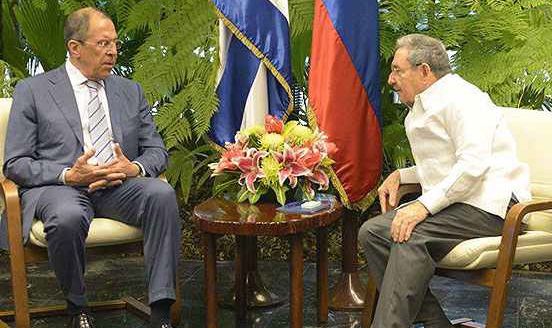
Lavrov’s Cuba visit: Spoke of $3.2 billion investment
Arriving last Tuesday night in Managua after a busy day in Cuba, Russian Foreign Minister Sergei Viktorovich Lavrov made an interesting statement.
“Because of the current situation in the world, it is important to synchronize watches with our allies,” he said. In Havana that day, he had done just that.
Lavrov met with his Cuban counterpart, Bruno Rodríguez Parrilla, for an official round of talks. A communiqué from the Cuban Foreign Ministry said that, “during the fraternal encounter, both ministers ascertained the excellent state of the relations in all areas and expressed their satisfaction over the political dialogue established between both nations.
“They also exchanged views on the intense bilateral agenda, the outlook for development of their ties in the economic-commercial sphere, the preparations for the official visit of President Vladimir Putin, and aspects of the international situation that are of mutual interest.”

The document did not say when Putin would visit Cuba.
Rodríguez “restated that the attempt to extend NATO to the borders of the Russian Federation is a grave threat to international peace and security,” and rejected the sanctions recently imposed against Russia by the United States and the European Union, the communiqué stated.
“Cuba forcefully rejects the imposition of sanctions against Russia, knowing that those who impose them are the same governments that have launched wars of conquest, that intervene into the internal affairs of sovereign countries and provoke destabilization,” Rodríguez said.
Lavrov’s trip to four Latin American capitals comes at a time when tensions have risen over Crimea’s decision to separate from Ukraine and join the Russian Federation.
The West’s sanctions “defy all common sense, with regard to events in Ukraine,” Lavrov said. In an apparent allusion to U.S. President Barack Obama, he said that “the attempts to blame others come from a kind of weak politician, or rather, of those politicians who understand that their geopolitical ambitions failed and now attempt to blame others.”
He thanked Cuba for its “understanding” and “firm support” for Russia’s position in the Crimean situation and criticized again Washington’s “inadmissible blockade” against Cuba.
According to sources, during the meeting, “the parties reviewed the accords of bilateral cooperation signed by Moscow and Havana in 2013, in areas such as energy, pharmaceutics, transportation and infrastructure.”

Lavrov spoke about an “important” agreement involving Cuba’s debt to Russia. He explained that one tenth of that debt will be forgiven and invested by Russia into projects on the island. That investment will total $3.2 billion.
The minister found time to present Rodríguez and Deputy Foreign Minister Abelardo Moreno with the Russian Award for Cooperation, a symbol of the cooperation between the two ministries and governments.
Later in the day, Lavrov met with President Raúl Castro Ruz. An official statement said that, “in a fraternal environment, Raúl and the Russian chancellor ascertained with satisfaction the excellent state of the bilateral relations, in constant development, and their promising future, atune with the links of brotherhood that exist between our peoples and governments. They also exchanged views on the ongoing international events.”
After that meeting, Lavrov left for Nicaragua, where he met with President Daniel Ortega Saavedra. Later this week, the Russian minister will travel to Peru and Chile.
[Photo at top courtesy of the Russian Foreign Ministry.]

